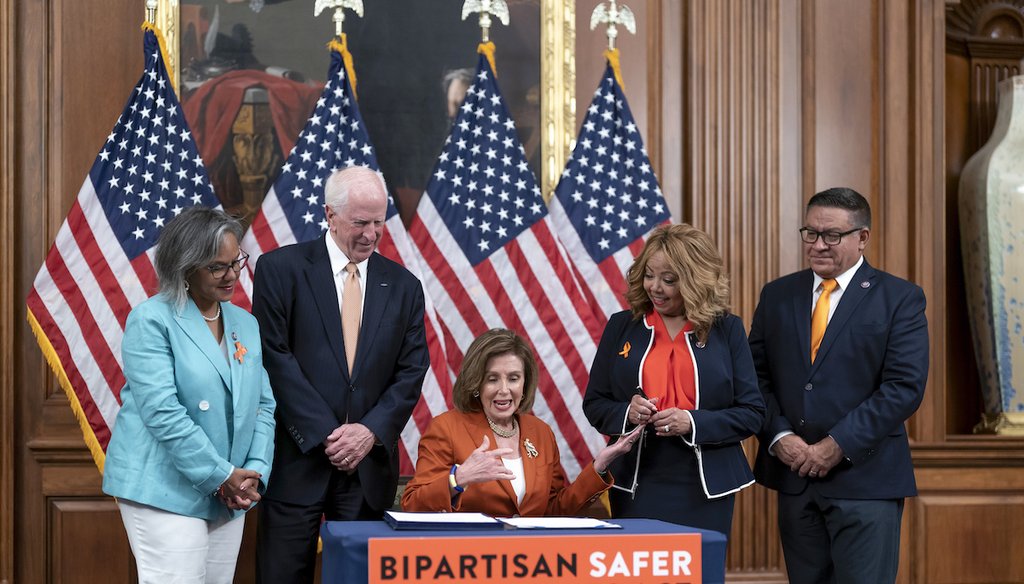Stand up for the facts!
Our only agenda is to publish the truth so you can be an informed participant in democracy.
We need your help.
I would like to contribute

Speaker of the House Nancy Pelosi, D-Calif., seated at center, is joined by, from left, Rep. Robin Kelly, D-Ill., Rep. Mike Thompson, D-Calif., chairman of the House Gun Violence Prevention Task Force, Rep. Lucy McBath, D-Ga., and Rep. Salud Carbajal, D-C
If Your Time is short
-
The Senate and the House of Representatives passed a bipartisan gun bill one month after a deadly elementary school shooting in Uvalde, Texas.
-
The bill combines gun safety legislation with funding for mental health and school security resources.
-
It has been decades since Congress has taken any action on gun control.
One month after the deadly elementary school shooting in Uvalde, Texas, the U.S. Congress passed a bipartisan bill crafted to prevent future school shootings.
It’s poised to become the first gun control action from Congress in nearly three decades.
The U.S. House of Representatives passed the bill 234-193 on June 24, following the Senate’s 65-33 vote on June 23.
"After 28 years of inaction, bipartisan members of Congress came together to heed the call of families across the country and passed legislation to address the scourge of gun violence in our communities," President Joe Biden said in a June 23 statement expressing his support for the proposal.
Sign up for PolitiFact texts
Tonight, bipartisan members of Congress passed legislation to address the scourge of gun violence across America.
— President Biden (@POTUS) June 24, 2022
Our kids and our nation will be safer because of this legislation. The House of Representatives should promptly vote and send it to my desk.
The bill combines gun safety legislation with mental health and school security resources. Here’s an overview.
Funds for crisis intervention programs
The Edward Byrne Memorial Justice Assistance Grant (JAG) program will now allow states to use funding to implement what the bill describes as crisis intervention programs that provide alternatives to certain non-violent offenders. The bill provides $750 million over five years toward this effort.
States can also get funding to implement their "red flag laws" if such laws include provisions that protect due process — including the right to be represented by a lawyer, the right to an in-person hearing and the right to know opposing evidence. (Opponents of red flag laws argue that they infringe on due process rights.)
The bill does not implement a federal red flag law. Such laws, which allow people to petition a state court to order the temporary removal of firearms from a person who might present a danger to themselves or others, exist in 19 states and Washington D.C.
Improves background checks
Under federal law, licensed firearms dealers must perform a background check on buyers. This is done through the FBI’s National Instant Criminal Background Check System.
The same law lists people who cannot legally own a gun, including those convicted of a crime punishable by prison or someone who has been committed to a mental institution.
However, a background check completed through NICS could be missing mental health records and juvenile convictions if a state has not submitted that information.
As a result, for gun buyers under 21 years old, the new bill requires that background checks review if the buyer has a juvenile record that would disqualify them from buying a gun. For this, the FBI has to contact state juvenile justice information systems, mental health adjudication records and local law enforcement agencies.
Over five years, $200 million in grants will go to states to upgrade criminal and mental health records scanned in background checks.
Closes domestic violence loopholes
Federal law bars anyone convicted of a felony from owning a firearm.
The law also bars anyone convicted of a misdemeanor crime of domestic violence or people on the receiving end of a restraining order from owning a gun if they lived with, were married to or had a child with the victim. But this restriction does not apply to people who are dating, and this is what is commonly called the "boyfriend loophole."
The new legislation will update the definition to include "a person who has a current or recent former dating relationship with the victim."
A dating relationship, the bill defines, is "a relationship between individuals who have or have recently had a continuing serious relationship of a romantic or intimate nature."
According to the bill, a dating relationship can be determined based on its length, nature and frequency.
The bill clarifies that a "casual acquaintanceship or ordinary fraternization in a business or social context" does not fall under this definition. This change is not retroactive.
If a person only has one conviction of a misdemeanor for domestic violence, that person’s right to purchase a gun can be restored after five years with a clean criminal record.
According to the bill, this restoration does not apply for people who lived with, were married to or had a child with the victim.
Makes straw purchases and gun trafficking illegal
Straw purchases happen when someone buys a gun on behalf of someone else. The straw purchaser in this scenario tells the seller they will be the owner of the gun.
These purchases are illegal under federal law because the buyer is making a false statement to buy the gun.
The bill establishes criminal offenses and penalties of up to 15 years for straw purchases and gun trafficking. Time in prison increases to 25 years if the gun is used in a serious crime like terrorism and drug trafficking.
Clarifies definition of a ‘federally licensed firearms dealer’
Under federal law, performing background checks and maintaining records of all gun sales are only required for federally licensed firearms dealers.
A 1986 federal law defined these licensed dealers as "a person who devotes time, attention, and labor to dealing in firearms as a regular course of trade or business with the principal objective of livelihood and profit through the repetitive purchase and resale of firearms."
This definition excludes people who make occasional sales or sell firearms as a hobby, so they’re not required to run background checks on potential buyers.
But the new bill includes people who sell guns "to predominantly earn a profit" under the definition of a licensed firearms dealer.
Increases funding for mental health and school safety
The bill increases funding for mental health and school safety resources. It includes additional grants to expand Certified Community Behavioral Clinics that provide mental health and substance abuse services.
States will also receive technical assistance and guidance to improve access to and implementation of telehealth services under Medicaid.
And under the bill, guidance for health services in schools will be issued by the Secretary of Health and Human Services and Secretary of Education.
In a Twitter thread summarizing the bill, Sen. Chris Murphy, D-Conn., a bill co-sponsor, said it includes an $11 billion investment in mental health.
Here it is, folks - the Bipartisan Safer Communities Act, the most significant piece of anti-gun violence legislation in nearly 30 years.
— Chris Murphy (@ChrisMurphyCT) June 21, 2022
This bill is going to save thousands of lives.
1/ We just released the text. Let me tell you what it does:
A document from Murphy’s office provides a breakdown of this funding, which includes:
-
$80 million in grants for pediatricians to access mental health specialists;
-
$60 million over five years for mental health training to primary care clinicians who treat children;
-
$250 million for states to improve community mental health services; and
-
$150 million to implement a suicide and crisis hotline providing free support.
Murphy also mentioned an investment of $2 billion in funding for school safety initiatives and anti-violence programs.
Our Sources
PolitiFact, What is in the Senate’s gun legislation proposal after the Uvalde shooting?, June 24, 2022
U.S. Senate, Safer Communities Act, accessed June 24, 2022
White House, Statement by President Biden on the Senate Passage of Bipartisan Gun Legislation, June 23, 2022
Sen. Chris Murphy, Bipartisan Safer Communities Act, accessed June 24, 2022
PolitiFact, Ask PolitiFact: What are red flag gun laws and do they keep people safe?, June 10, 2022
Bureau of Justice Assistance U.S. Department of Justice, Mental Health Courts Program, accessed June 24, 2022
National Institute of Justice U.S. Department of Justice, Overview of Drug Courts, accessed June 24, 2022
U.S. Senate, About Filibusters and Cloture, accessed June 24, 2022
The Unified Judicial System of Pennsylvania, Veterans Treatment Courts, accessed June 24, 2022
Giffords Law Center, NICS & Reporting Procedures, accessed June 24, 2022
Bureau of Alcohol, Tobacco, Firearms and Explosives, Are there persons who cannot legally receive or possess firearms and/or ammunition?, accessed June 24, 2022
Congressional Research Service, Submission of Mental Health Records to NICS and the HIPAA Privacy Rule, April 15, 2013
PolitiFact, Federal law’s ‘boyfriend loophole’ is not so simple, Aug. 22, 2019
Giffords Law Center, Domestic Violence and Firearms, accessed June 24, 2022
Bureau of Alcohol, Tobacco, Firearms and Explosives, Federal Firearm Licensee Information service Newsletter, June 2021
Legal Information Institute, 18 U.S. Code 922 – Unlawful Acts, accessed June 24, 2022
Bureau of Alcohol, Tobacco, Firearms and Explosives, Gun Control Act of 1968, accessed June 24, 2022
Congress.gov, S.49 - Firearms Owners' Protection Act, accessed June 24, 2022
Debbie Stabenow press release, Senators Stabenow, Blunt Lead Mental Health Initiative in Bipartisan Proposal, June 12, 2022
Sen. Chris Murphy, Twitter thread, June 21, 2022
Email exchange with Murphy McCullough, Texas press secretary for U.S. Senator John Cornyn, June 24, 2022












































